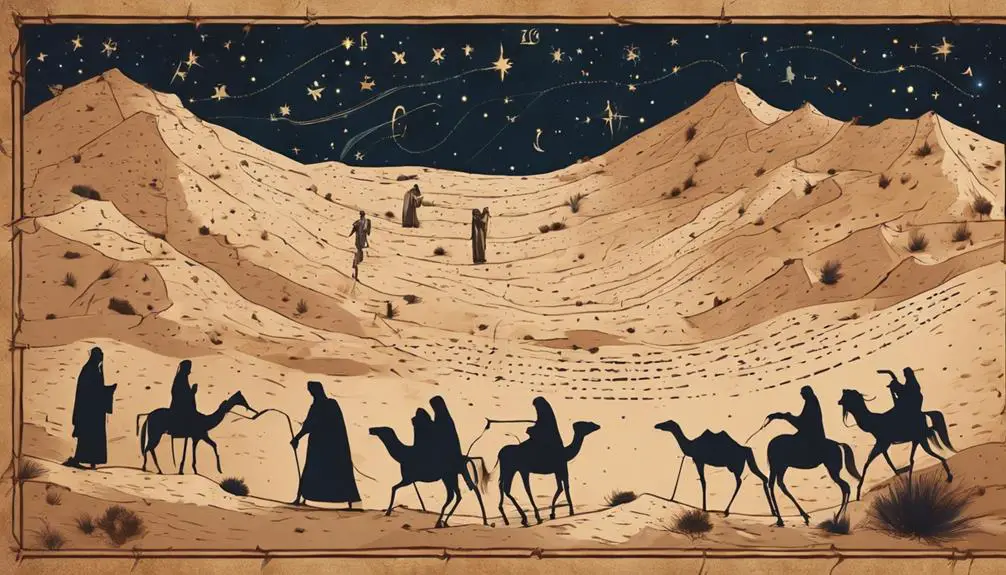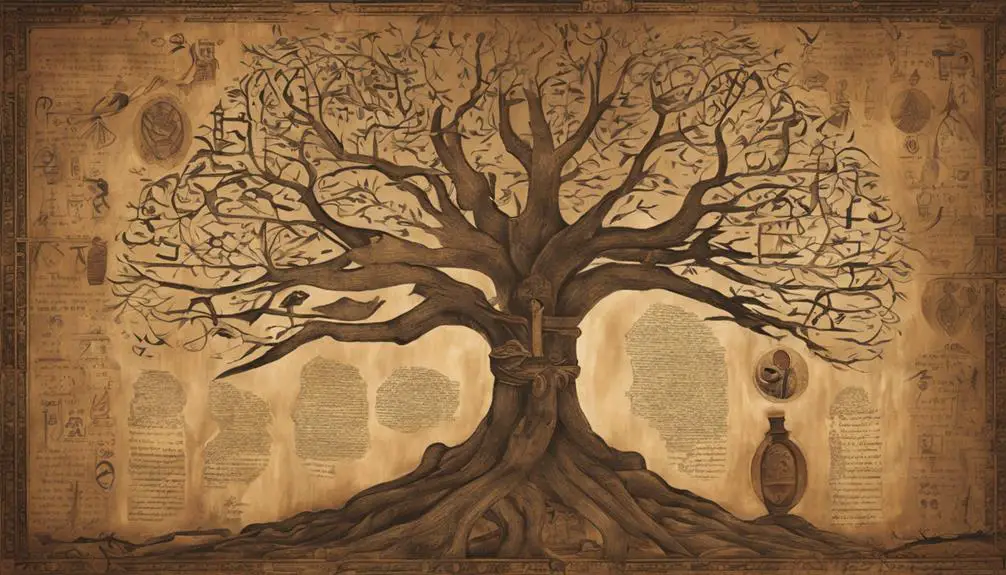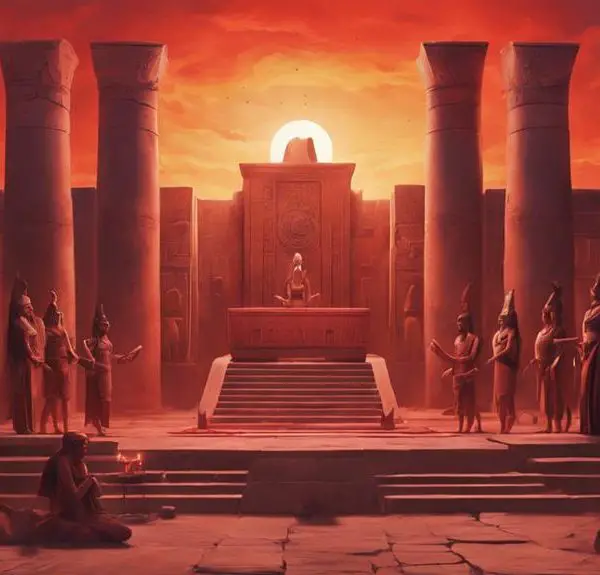Biblical names starting with 'Z' unveil compelling stories and hidden wisdom, beckoning readers to explore their profound depths.

Names With Z in the Bible
Like a hidden treasure waiting to be uncovered, names with 'Z' in the Bible hold layers of significance and stories that are often overlooked.
You might find Zechariah's prophetic legacy intriguing, or Zacchaeus's tale of transformation and redemption a compelling study on character evolution.
Perhaps Zephaniah's warnings or the valor of Zebulun spark your interest, not to mention the mystery surrounding Zillah.
Each name carries with it a narrative rich in history and spiritual insight. Let's pull back the curtain on these lesser-known characters and discover what lessons they hold for us today.
Why, you may ask? Because within these names lies wisdom and tales of human nature that are as relevant now as they were centuries ago.
Key Takeaways
- Biblical names starting with Z often signify characters involved in divine communication and transformation.
- Figures like Zechariah and Zephaniah played pivotal roles in prophetic traditions and societal admonitions.
- Zacchaeus' story highlights themes of redemption, showcasing the inclusivity of divine grace.
- Names such as Zebulun and Zillah reveal insights into societal dynamics, valor, and historical context in biblical narratives.
Zechariah's Prophetic Legacy

Zechariah's prophetic legacy, embedded deeply within the tapestry of biblical narrative, offers a profound exploration of divine communication and eschatological themes, reshaping our understanding of ancient prophetic traditions. Central to this legacy are Zechariah's visions and Messianic predictions, which not only illuminate the socio-political context of his time but also offer a transcendent vision of hope and restoration. Through an analytical lens, you'll find that Zechariah's visions are characterized by their symbolic complexity and theological depth. They serve as a bridge between the immediate historical circumstances of the post-exilic community and the ultimate fulfillment of God's promises.
Moreover, Zechariah's Messianic predictions are particularly notable for their detailed portrayal of a coming savior, a king who'd usher in an era of peace and justice. These predictions, deeply messianic in nature, contribute significantly to the Judaic understanding of a Messiah and have profound implications for Christian eschatological thought. Through Zechariah's prophetic utterances, you're invited into a narrative that transcends time, urging a reevaluation of divine intervention and the unfolding of divine plans across the ages.
Zacchaeus: Transformation and Redemption

Exploring further into the biblical narratives, we encounter the story of Zacchaeus, whose journey of transformation and redemption profoundly illustrates the power of personal change and divine grace. Zacchaeus' conversion, centered on his unexpected encounter with Jesus, marks a pivotal moment in the tax collector's story, challenging and reshaping societal perceptions of sin and redemption.
Aspect of Zacchaeus' Story |
Significance |
|---|---|
His profession as a tax collector |
Symbolizes societal alienation and personal greed |
Climbing the sycamore tree |
Demonstrates humility and a desire for change |
Jesus' invitation to himself |
Highlights divine grace and acceptance |
Zacchaeus' pledge to give to the poor |
Marks a tangible step towards restitution |
Jesus' proclamation of salvation |
Affirms the inclusivity of divine redemption |
This narrative not only showcases Zacchaeus' personal transformation but also serves as a testament to the broader themes of forgiveness and the transformative power of grace. It underscores the notion that no one is beyond the reach of redemption, challenging readers to reflect on the dynamics of personal change and the unconditional nature of divine love.
Zephaniah's Dire Warnings

Delving into the Book of Zephaniah, we encounter stark warnings that underscore the impending judgment and the necessity for societal repentance. Zephaniah's timeframe, set during the reign of King Josiah, is a period rife with idolatry and moral decline, prompting these vehement admonitions. The prophet's use of apocalyptic imagery vividly conveys the severity of the situation, aiming to jolt the society out of complacency.
To grasp the weight of Zephaniah's message, consider these key points:
- Zephaniah's timeframe: His prophecies occur during a critical juncture in Judah's history, amplifying the urgency of his warnings.
- Call for repentance: He emphasizes a turning away from corruption and idolatry to avoid divine retribution.
- Apocalyptic imagery: Zephaniah employs vivid descriptions of destruction to illustrate the potential consequences of continued sinfulness.
- Societal impact: His warnings aren't merely for the elite but address the collective moral decay, underscoring the need for widespread reform.
Zephaniah's dire warnings serve as a potent reminder of the consequences of moral and spiritual neglect. His message, though centuries old, resonates with timeless relevance, urging societies to reflect and amend their ways.
The Valor of Zebulun

In biblical narratives, the tribe of Zebulun is often heralded for its extraordinary bravery and strategic contributions to Israel's military campaigns. You'll find that Zebulun's territory, strategically positioned, played a pivotal role in their ability to support these efforts. Their lands, rich in resources and critical trade routes, underscored the tribal significance not just economically but militarily.
To understand the valor and strategic acumen of Zebulun, let's delve deeper into their contributions and characteristics:
Aspect |
Detail |
Importance |
|---|---|---|
Location |
Zebulun's territory nestled in Galilee |
Enabled control over vital trade routes |
Military |
Noted for bravery in battle |
Enhanced Israel's defense capabilities |
Economy |
Benefited from trade and agriculture |
Supported military and societal needs |
Prophecy |
Jacob's blessings highlighted Zebulun's seafaring |
Presaged the tribe's economic strengths |
Legacy |
Their valor commemorated in biblical texts |
Continues to inspire values of courage and loyalty |
Their tale isn't merely one of martial prowess but also of leveraging their geographical and economic strengths for the greater good of Israel. The tribe of Zebulun exemplifies how courage, when paired with strategic insight, can forge a legacy that endures through ages. This duality of valor and strategic importance marks Zebulun's unique place in biblical history.
Exploring the Mystery of Zillah

Zillah, a lesser-known figure in the biblical narrative, holds a mystery that scholars have pondered for centuries. Delving into the depths of her story, you uncover layers of ancient significance tied to Zillah's lineage. Her mention is brief, yet her impact is profound, revealing much about the societal and familial structures of her time.
To grasp the enigma that Zillah presents, consider these pivotal aspects:
- Zillah's Role in Genealogy: She stands as a testament to the matriarchal elements within ancient texts, offering insights into lineage and heritage.
- Cultural Implications: Zillah's existence sheds light on the norms and values of her era, reflecting the multifaceted roles women played.
- Symbolic Interpretations: Scholars scrutinize her name and story for symbolic meanings, suggesting a deeper, spiritual significance.
- Historical Context: Understanding Zillah within her historical setting reveals the societal dynamics and how they influenced biblical narratives.
Analyzing Zillah's story, you're drawn into a rich tapestry of historical and theological inquiry. Her presence, though fleeting, provides a window into the complex interplay of culture, family, and faith in ancient times, enriching our understanding of biblical history.
Frequently Asked Questions
Are There Any Female Names With 'Z' in the Bible, and What Do Their Stories Tell Us About the Role of Women in Biblical Narratives?
Yes, you'll find female names with 'z' in biblical narratives, revealing insights into women's roles and leadership. These stories aren't just historical accounts; they're rich with cultural representation, showcasing the complexities of women's lives in ancient times.
How Do Biblical Names With 'Z' Influence Modern Naming Conventions in Various Cultures Around the World?
You're exploring how unique names influence modern naming conventions globally.
It's fascinating to see the cultural adaptation of these monikers over time. Naming trends don't just reflect personal taste; they're deeply tied to societal values and historical narratives.
By analyzing these patterns, you're uncovering how cultures assimilate and transform traditional names into contemporary identities.
It's a detailed study, revealing the intricate relationship between history, culture, and the evolution of names.
Can the Meaning of Names With 'Z' in the Bible Provide Insights Into the Personality Traits or Destinies of the Characters They Belong To?
You're exploring if names' meanings can hint at characters' personalities or destinies. By examining zodiacal influences and numerology applications, you'll find that each name isn't just a label but a complex symbol.
This analysis reveals how specific characteristics and potential life paths are intricately linked to names. It's a scholarly journey into understanding how ancient naming conventions might still echo today, shaping perceptions and expectations around personality traits and destinies.
How Are Names With 'Z' in the Bible Represented or Interpreted in Different Translations and Versions of the Bible?
When you explore how names are represented across various translations and versions of the Bible, you delve into the complexities of translation methodologies and their cultural significance.
Each translation reflects different scholarly interpretations and linguistic nuances, often influenced by the cultural and historical context of the translators.
This analysis reveals how the meanings and pronunciations of names can shift, offering insight into the evolving perceptions of these biblical figures across time and cultures.
What Are the Challenges and Controversies Surrounding the Historical and Archaeological Evidence of Biblical Figures With 'Z' in Their Names?
You're diving into a complex topic when exploring the historicity and archaeological evidence of biblical figures.
One challenge you'll encounter is the scarcity of direct evidence for individuals like Zerubbabel and Zechariah.
The controversies often stem from interpreting archaeological findings and ancient texts.
For instance, debates rage over Zerubbabel's leadership role and the authenticity of Zechariah's prophecies due to limited concrete evidence.
This requires a nuanced, analytical approach to piece together historical truths.
Conclusion
In analyzing the biblical characters with 'Z' in their names, you uncover a tapestry of profound narratives. Zechariah's prophecies, Zacchaeus's transformation, Zephaniah's warnings, Zebulun's valor, and the enigmatic Zillah offer insights into divine communication, personal redemption, impending judgment, tribal significance, and mysterious figures.
These stories not only enrich our understanding of biblical literature but also invite deeper contemplation on the complexity of faith, morality, and human nature within these ancient texts.



Sign up